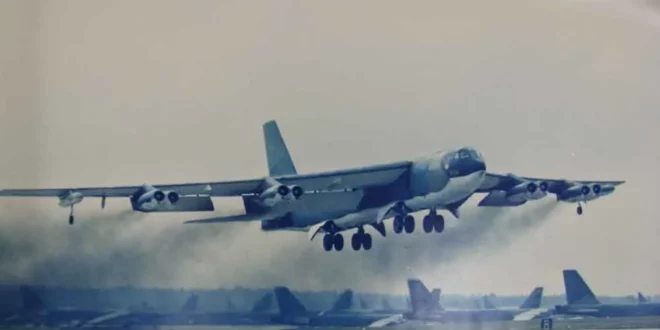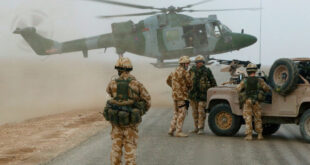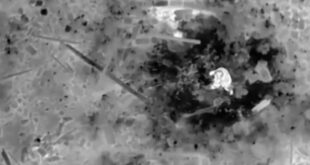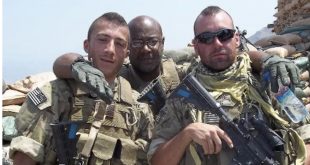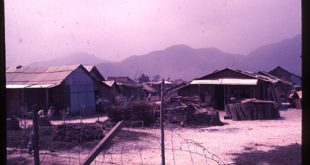by David Nelson, The War Horse
I woke up early on the morning of Dec. 6, 1972, to pack and say tearful goodbyes to my wife, Martie, and our one-year-old daughter, Amy. We’d decided ahead of time that my father-in-law “Pop” Lowry would drive me from Temple, Texas, to Love Field in Dallas, to begin my long journey to Okinawa, Japan.
Pop and I spoke very little as the cold, gray day blurred by the car windows. I was lost in thought, and my stomach turned. How had I ended up headed overseas for a year without my family, with the possibility of going to Vietnam
I’d joined the Marine Corps Officer Program in October 1965 as a junior at Texas Tech University. Soon after, Robert McNamara said he expected our troops home by Christmas. Although President Lyndon Johnson had sent thousands of troops to Vietnam that spring, I naively believed the war would be over by the time I graduated in 1967.
It wasn’t, and I breathed a sigh of relief when I transferred into a Marine Corps law program that year. Surely the Vietnam War would be over by the time I graduated from law school in 1970. Yet two more years had passed since my graduation—seven since I’d joined the Marines—and I was headed to Okinawa in what had become America’s longest war.
After a smooth flight from Dallas to Los Angeles, I bought a ticket at the airport for a bus ride to Norton Air Force Base in San Bernardino. From there, I planned to take a Military Airlift Command flight to Okinawa later that evening. Once I arrived at Norton, though, the flight scheduler told me the military intentionally overbooked MAC flights. There was no room for me, he said, and the next flight out left in two days.
I walked away, dejected. The clock on my 12-month tour wouldn’t start until I arrived in Okinawa, and two more days at Norton felt eternal. Then, around midnight, a seat on that night’s flight opened up. I was more than happy to squeeze into a middle seat at the rear of an old but sturdy 707. We took off around 2 a.m., and after a stopover in Honolulu, we headed almost due west to Okinawa—and encountered strong headwinds. The pilot announced we were low on fuel and would need to stop on Wake Island in the middle of the Pacific Ocean.
It felt good to deplane and stretch my legs and even better to land at Kadena Air Base after 18 hours in the air. It was Dec. 7, 1972, Pearl Harbor Remembrance Day. Next stop: Camp Hansen, where an old friend from Camp Lejeune, Capt. Mike Smolenski, greeted me. In charge of the JAG office, Mike was scheduled to rotate back to the U.S. in a couple of months. While I was delighted to see him, I also felt a surge of jealousy that he would soon return to the “world.” Before he left, Mike sold me his small, blue Fiat for a bargain price of $225.
I didn’t know it at the time, but I had arrived in Japan just a couple of weeks before the start of Operation Linebacker II, the “Christmas bombings” ordered by President Nixon after a breakdown in peace talks between the U.S and North Vietnam. From Dec. 18 to Dec. 29—except for Christmas Day—the U.S. conducted the most intense bombing campaign of the Vietnam War.
The Japanese didn’t allow B-52 bombers and fighter jets to fly in and out of Okinawa. But the U.S. could fly its SR-71 Blackbird spy plane and refueling KC-135 tankers anywhere. When a deafening roar woke me early on the morning of Dec. 18, 1972, I knew something significant was happening. I raced outside and watched in awe as wave after wave of the KC-135s headed off the island. The planes flew so low over my BOQ I could see and smell the lingering jet fumes. The prevailing scuttlebutt at work that day, which proved accurate, was that the tankers were headed for a refueling mission over North Vietnam.
Later that evening, the refueling tankers arrived back on the island in distinct, almost choreographed waves. I silently wondered if the same number that left that morning had returned—and how many of the refueled B-52s and fighter jets hadn’t made it.
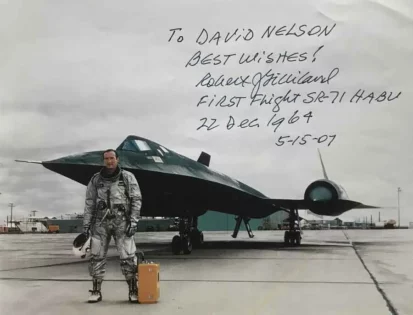
David Nelson got a close-up view of the aircraft in Okinawa. Photo courtesy of the author.
The same scenario of early flights to North Vietnam and late afternoon returns to Okinawa continued until Dec. 29, with a break on Christmas. That day, the Camp Hansen Officer’s Club served a special meal I described in a letter home to my wife: shrimp cocktail, turkey and dressing, corn, sweet potatoes, banana meringue pie, cranberry sauce, and mixed nuts, all for a dollar. “Everybody got stuffed,” I wrote.
Afterward, I wandered into a room of the club with an old-fashioned juke box. For a nickel, I played a Smokey Robinson song I’d always enjoyed, “The Tears Of A Clown.” Some of the words seemed especially appropriate that Christmas, when I was halfway around the world from loved ones:
But don’t let my glad expression
Give you the wrong impression
Really I’m sad, oh I’m sadder than sad
You’re gone and I’m hurting so bad
Like a clown I appear to be glad
One afternoon, I drove along the main highway near Kadena and almost lost control of my vehicle. The infamous SR-71 Blackbird—nicknamed Habu after a venomous snake indigenous to Okinawa—landed almost directly in front of me. The noise and closeness of the spy plane startled me, and I immediately wondered if it was returning from a surveillance mission over North Vietnam.
I pulled my car off the road to watch the final landing and noticed how quickly the plane was wheeled into a hangar, out of sight. The sleek design of the plane struck me—like a long, sharp pencil with two tail fins. No wonder it was never shot down by the enemy!
The bombings continued until Dec. 29, when the North Vietnamese agreed to resume negotiations. The Paris Peace Accords were signed a few weeks later. The Jan. 25, 1973, edition of the Pacific Stars and Stripes announced the war’s end for U.S. troops: “CEASE-FIRE! All GIs Out of Viet in 60 Days.”
Fifty years have passed since I arrived in Okinawa just in time for the Christmas bombings and the end of the Vietnam War for America. But the half-century-old memories remain forever etched in my mind.
David Nelson spent three years on active duty in the Marine Corps and achieved the rank of captain. When the Vietnam war ended in late January 1973, he was stationed in Okinawa.
Editors Note: This article first appeared on The War Horse, an award-winning nonprofit news organization educating the public on military service.
 Soldier of Fortune Magazine The Journal of Professional Adventurers
Soldier of Fortune Magazine The Journal of Professional Adventurers


